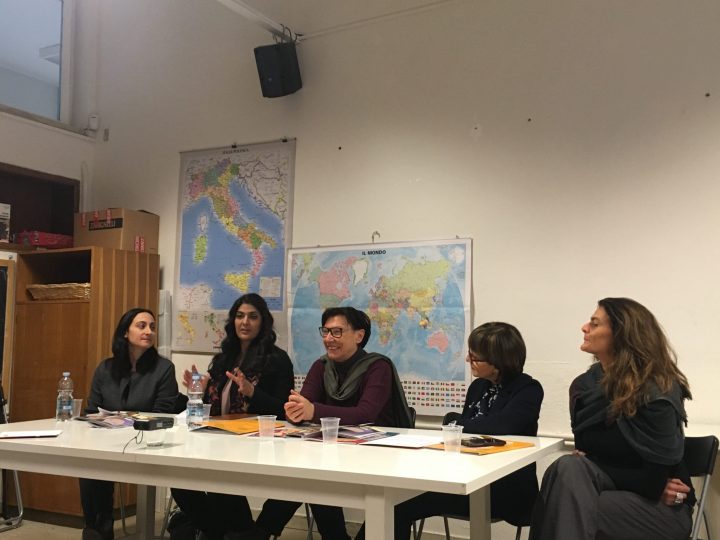Selay Ghaffar is the spokesperson for the Solidarity Party of Afghanistan. At the release of “Exit from Violence. You are not alone” handbook on Tuesday November 28th at Casa delle Donne di Milano, she spoke about the current situation for Afghan women and girls, why she switched from civil society to politics and how often women are used as showpieces rather than involved participants in the work for peace Afghanistan so desperately needs. We were able to speak with Selay one-on-one for more information on her experiences and the Solidarity Party of Afghanistan.
Can you tell us about your political party, Solidarity Party of Afghanistan, and what are their objectives?
The Solidarity Party of Afghanistan is against the occupation by US and NATO forces. We consider the current Afghan government a ‘puppet government’ controlled by the US/NATO occupiers and also consider it a terror government. Our party calls for the persecution of war criminals in the country that have perpetrated crimes against the Afghan people, from the Soviets to the Mujahideen to the Taliban to US forces. The Solidarity Party believes in gender equality and that true revolution in Afghanistan can only be attained if both women and men have equal voices and participation. Our goal is to free Afghanistan from foreign influence.
Can you tell me about your relationship with Italian activist groups, including CISDA?
The Solidarity Party of Afghanistan believes in the power of internationalism and solidarity. I believe that progressive forces can work together no matter their location, which has been our case working with progressive activists in Italy. They can amplify our message by spreading it to their country and they can also put pressure on their government, which has a lot of influence in Afghanistan.
How important is the international network you’ve created around the world? Was it difficult to make it?
Progressive forces can work together from around the world because they share the same ideology. Common ideology is what’s important and it’s what brought this international network together. Having that commonality has made building our network easy.
Where do you draw your strength and courage from to do this work?
I know how strong our desire is, as a people, to be rid of violence. Having witnessed the violence and suffering in our country firsthand, I know exactly why I must find the strength to change things in my country. I know that the people of Afghanistan support me, and we are on the same side, as I am constantly receiving support and encouragement even from simple emails and Facebook messages. The people of Afghanistan are tired of the violence.
What is your message to the average western citizen who doesn’t know much about the current situation in Afghanistan?
So much of the international solidarity our party receives is from ordinary western citizens. There is a big difference between the government occupiers of Afghanistan and the citizens of those countries. Your duty is to put pressure on your government to stop their involvement in Afghanistan, and you have the right to demand your tax money is not spent funding war.
For example, CISDA organized a national protest of Afghan warlord-turned-parliamentarian Mohammed Mohaqiq‘s visit to Italy. Many war criminals that now hold power travel in and out of the West on dual passports. Citizen mobilizing to prevent their entrance into western countries brings awareness and shows governments that their citizens won’t stand for it.
How do you feel about peace-building prospects in Afghanistan’s future? Are women situated to be part of the peace-building process?
The country is thirsty for peace, but to have true peace there must be justice. Justice is key to hold responsible those who have committed violence and atrocities. Current attempts at peace building by the US, NATO and the Afghan government have war criminals at the table, which is meaningless. For example the government invited a warlord commonly known as “the butcher of Kabul”, Gulbuddin Hekmatyar, to peace talks. In reality, little progress towards peace has been made in this way. It won’t change unless we make justice a part of the peace process.
Women’s participation is crucial to justice and peace in Afghanistan. Fundamentalism, one of Afghanistan’s greatest barriers to peace, can only be fought by both genders. So far women have been used more as showpieces to fake the illusion of progress, and in reality little progress towards gender parity and peace have been made. I am skeptical when ‘women’s rights’ are used to justify government actions, as women are rarely involved and often it’s only to gain funding.










